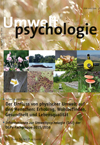Artikeldetails
 Carlo Fabian (2016),
Carlo Fabian (2016),Der Beitrag partizipativer Prozesse bei der Freiraumentwicklung für die Gesundheit von Kindern.
Umweltpsychologie 20(2), 112-136.
Dieser Artikel wurde in deutsch verfasst.
| Zusammenfassung: | Natur und Naturerlebnisse haben einen positiven Effekt auf die Gesundheit von Menschen, ganz besonders auf die Gesundheit von Kindern und Jugendlichen, die sich physisch, psychisch und kognitiv noch entwickeln und dafür Reize brauchen, wie die Natur sie bietet. Darum ist die Entwicklung und Gestaltung von kindergerechten und naturnahen Freiräumen heute ein wichtiges Anliegen, und hier wiederum ist Partizipation ein aktueller und oft geforderter Ansatz, denn partizipative Entwicklungsprojekte unterstützen die Identifikation mit dem Freiraum oder der Stadt. Allerdings bestand bislang kaum Interesse an der Frage, ob und welchen Einfluss die partizipativen Prozesse selbst auf gesundheitsrelevante Faktoren haben. Der Beitrag geht dieser Frage anhand eines konkreten, auf die Teilhabe von Kindern bei der Gestaltung von Freiräumen fokussierten Praxisbeispiels nach. Diskutiert werden relevante Aspekte im Hinblick auf Stadt- und Raumentwicklung, Gesundheit und deren Determinanten sowie Partizipation als Haltung und Methode. Es zeigt sich, dass partizipative Prozesse verschiedene gesundheitsrelevante Faktoren stimulieren: Empowerment und Autonomie, Selbstwirksamkeit, Attribution und Kontrollüberzeugungen sowie Kohärenzgefühl. Es fehlen aber empirische Untersuchungen zu den konkreten Voraussetzungen, Wirkmechanismen und Effekte solcher Prozesse. Hier gilt es eine Forschungslücke zu schliessen. |
| Schlagworte: | Freiraum Gesundheitsförderung Kinder Partizipation Stadtentwicklung |
| Abstract: | Nature and experiences in nature have a positive effect on health, particularly on the health of children and adolescents, who are still developing physically, psychologically, and cognitively and who need stimuli of the kind that nature provides. Development and design of open spaces that are child-friendly and nearly natural is therefore an important concern today, and here, in turn, participation is a recent and often-called for approach, for participatory development projects support identification with the open space or the city. However, up to now there has been little interest in the question as to whether and how participatory processes themselves may have an impact on health determinants. This paper examines this question looking at a specific, practical example that focuses on children’s participation in the design of open spaces. Discussed are relevant aspects in view of urban and spatial development, health and its determinants, and participation as an approach and method. The findings indicate that participatory processes stimulate various health-relevant factors: empowerment and autonomy, self-efficacy, attribution and control beliefs, and sense of coherence. But there is a lack of empirical studies on the specific conditions, mechanisms, and effects of participatory processes. Future research should close this research gap. |
| Keywords: | Children Health Promotion Open Space Participation Urban Development |
Zum Inhaltsverzeichnis

